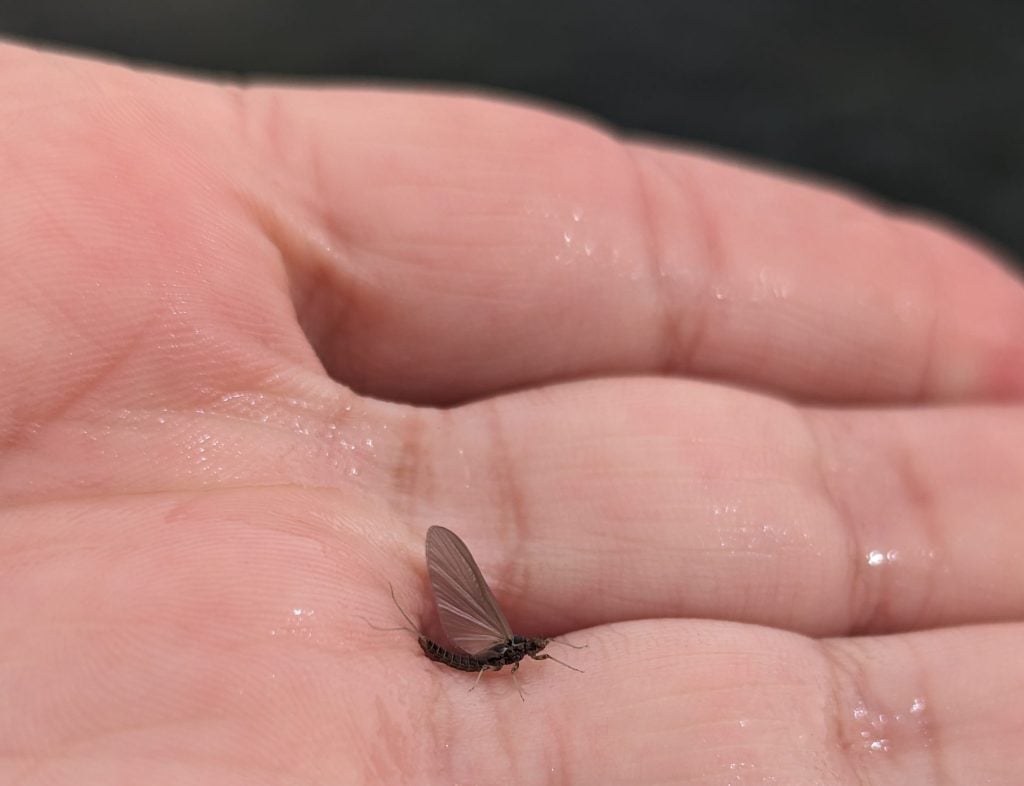
Spring has sprung in my corner of the Rockies, which means the mayflies are out in ever-increasing numbers, no longer confined to tailwaters. I fished my local creek this past Friday, too late in the day to catch the hatch, but I saw the remnants of mayflies in backeddies and foam lines.
The early-season mayflies in my neck of the woods are a darker, almost black-bodied cousin of the blue-winged olive. I fish flies with Adams-gray dubbing this time of year because it’s a better match for what’s on the water than traditional baetis or olive colors.
Every spring follows the same pattern: I head out in search of the earliest mayfly hatch possible, often getting skunked on a few trips before stumbling across something. The timing’s never the same year to year. This year, for instance, I got into mayflies in late February. Last year I didn’t fish a good mayfly hatch until mid-March.
When I do find the hatches, and fish willing to rise to them, I invariably fret over my fly box. What looked well-stocked and finely-tied at the bench now looks bedraggled and frumpy. No matter how much I tie beforehand, or how many new-to-me patterns I try, I never feel like I have enough mayfly imitations.
You’ll always find a few dozen sparkle duns in my box, as well as spinners, Last Chance Cripples, various emerger patterns, and, of course, parachutes. They’re tied in a variety of sizes and different shades of gray to dark green. You’d think that’s enough to get most folks through a hatch. I always worry, though, that I’m missing something.
I subscribe to the notion that presentation is more important than the pattern you fish, but my worry is that if I spend all day properly presenting the wrong pattern, then I’ve missed out on catching fish. It’s not enough to have an emerger, a cripple, a dun, and a spinner in my box. I’m convinced I need a certain kind of emerger, a flavor of cripple I haven’t yet discovered, and that when I do, I’ll crack some still-unknown code and catch loads of fish.
That train of thought runs counter to my belief (and the belief, I reckon, of many other anglers) that a good presentation makes up for a less-than-perfect fly. So, each spring, I’m stuck in this hamster-wheel of second-guessing myself, and I often leave the river with a feeling that the fish I caught were due more to luck than skill. I end up back at the tying vise, scrolling through tying tutorials, looking for that missing link. I’ve yet to find it, and in all honesty, don’t think I ever will.
But that won’t stop me from trying. I’m convinced that, no matter how many new-to-me patterns I tie up, I’ll never have enough mayflies.
The post Never Enough Mayflies appeared first on MidCurrent.
https://midcurrent.com/2024/04/08/never-enough-mayflies/
 CampingSurvivalistHuntingFishingExploringHikingPrivacy PolicyTerms And Conditions
CampingSurvivalistHuntingFishingExploringHikingPrivacy PolicyTerms And Conditions
